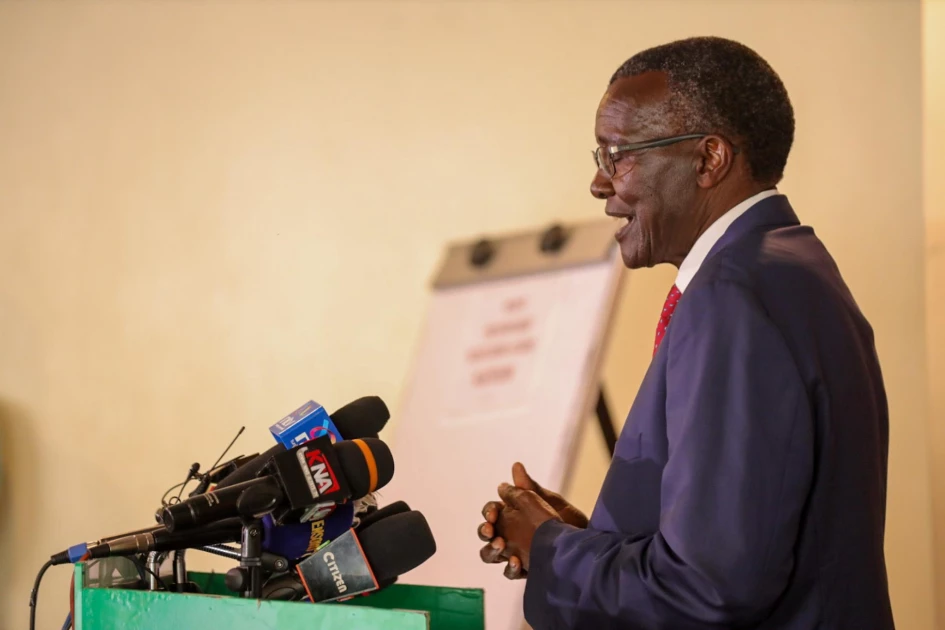Maraga faults Ruto for signing controversial Bills amid national mourning

He criticized the timing of the presidential assent, noting that it occurred “at the exact time the nation was grappling with the demise of Raila Odinga,” which he described as “insensitive and symbolic of the administration’s contempt for the people’s will.”

Audio By Vocalize
During a media briefing at Nairobi's Panafric Hotel on Tuesday, Maraga stated that the recent signing into law of eight controversial Bills marked a dangerous turning point for the country and exposed the government's disregard for constitutional principles.
“We stand here as Kenyans who are deeply concerned about the trajectory our country is taking,” said Maraga. “It is a mockery of the ideals that Raila Odinga fought for, and a mockery of the 2010 Constitution we swore to protect.”
He criticized the timing of the presidential assent, noting that it occurred “at the exact time the nation was grappling with the demise of Raila Odinga,” which he described as “insensitive and symbolic of the administration’s contempt for the people’s will.”
According to Maraga, a careful review of the Bills passed by the National Assembly revealed a pattern of betrayal by both the Executive and the Legislature.
He cited amendments to the Computer Misuse and Cybercrimes Act as particularly troubling, arguing that they were designed to suppress dissent and curtail political freedoms.
“The amendment seeks to control political expression,” he said. “It is not lost to us that in June 2024, when youth rose against the Finance Bill, President Ruto labeled them criminals and terrorists.”
Maraga warned that the changes give a government committee sweeping powers to shut down websites and digital platforms such as Facebook, YouTube, and TikTok under the guise of combating illegal activity.
He said the absence of judicial oversight in such actions amounted to a direct assault on media freedom and citizens’ right to free expression.
“This committee becomes the investigator and the judge, infringing on the freedom of media use,” he warned. “It lacks any form of judicial oversight, which is a clear violation of the rule of law.”
He further condemned the limited public participation that accompanied the passing of the Bills, accusing Parliament of ignoring submissions from citizens and even from relevant government ministries.
“These amendments are unconstitutional, null, and void,” he declared. “President Ruto has lost legitimacy to continue governing this country.”
Maraga revealed that legal redress was already being pursued by various actors opposed to the new laws.
“We cannot allow these freedoms to be buried silently,” he said. “Efforts are underway to seek court intervention, and we fully support these efforts.”
Turning his focus to the Privatization Act, Maraga accused the government of attempting to “rob Kenyans” by granting the President and the Treasury Cabinet Secretary unchecked authority to dispose of national assets.
He said the new law stripped away crucial oversight mechanisms that previously ensured transparency in the sale of public enterprises.
“Information on the valuation of public entities up for privatization is not mandatory,” Maraga noted. “The Act even exempts disclosure of the names of buyers. If they sell to themselves or their proxies, the Kenyan people will never know.”
He argued that the new privatization framework enables the executive to auction national assets without parliamentary approval, creating fertile ground for corruption.
“The Privatization Act gives Ruto power to do what he wants with public assets,” he said. “This government is out to rob Kenyans.”
Maraga also raised concerns about the country’s mounting debt, accusing the Kenya Kwanza administration of excessive borrowing. “The regime is currently borrowing over five billion shillings every week,” he said. “Why make our nation vulnerable? Who do you serve? Young Kenyans have already died protecting us from these injustices.”
He urged citizens to rise in defense of the nation’s sovereignty and resources, saying prosperity would not come from selling state corporations but from empowering ordinary Kenyans.
“Prosperity will not come by selling our strategic assets but by empowering Kenyans,” he emphasized. “We remind the state that sovereignty belongs to the people. The power lies with us—not with Parliament, the Executive, or foreign investors.”
Maraga further accused the government of moving hastily to implement the contentious laws before the courts could intervene.
“The government knows people are going to court. They are moving with speed so that by the time we obtain court orders, events will have overtaken us,” he said.
He concluded with a warning to future appointees to state corporations under his envisioned leadership, saying, “Those who will be put in those parastatals when I become President should either make profit or get out. This is not about loss-making institutions alone—it is a scheme to sell strategic assets like Kenya Pipeline.”


Leave a Comment